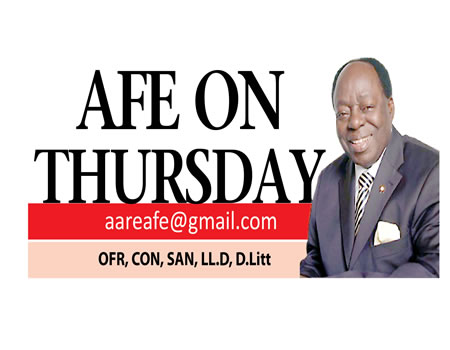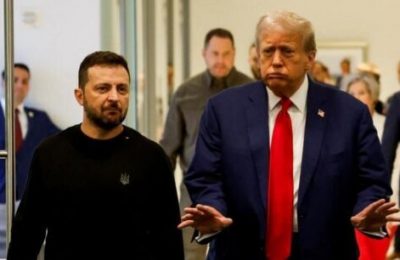
THE Western regional government made effective use of the concessions offered by the British Government both in the London conference and the 1954 constitution in moving a motion for self-government for the Region. This was unconditionally granted. Suffice it to say that the immediate dividends coupled with the visionary leadership the Region was endowed with were the setting up of mass oriented development projects which were unheard of in any part of Africa. For example the free primary education projects became an eye opener to the evils of illiteracy, poverty and degradation. Our fifty years since that pilot project on education was launched, the crave for education has been unmatched. The visible dividends are there for all to see and they remain indelible till date.

Under the same self-government arrangement, the first television station in Africa was established in Ibadan. The first International stadium, Liberty stadium was also constructed. The Cocoa House, a 25 storey building complex was built not only to give due credit to Cocoa as the then leading income earner but to provide an edifile that would stimulate commerce. The building still stands in Ibadan today as the tallest building. The University of Ife was also constructed by the Western region government. Marketing Boards were established here and there by the government and the first indigenous black bank, the National Bank of Nigeria was set up significantly by the government of the western region. These giant studies were soon to be envied by other regions, and in quick succession, Eastern region and Northerners requested for self-government were respectively granted in 1957 and 1959.
With all the regions already savouring the dividends of internal self-government, the country was evidently now fully prepared for Independence which she got on a platter of gold in 1960.The Independence constitution of 1960 for the first time included a chapter of fundamental Human Rights. In the event of a conflict in matters relating to law promulgated by a state or region with the constitution or any other Act of the Federal Legislature that other law should be void. The amendment process was stated to be a two third majority of members of the House of Representatives and of the Senate and in matters relating to regional rights such as creation of a state out of a region, by two third majority of the regional legislature including the state concerned, after a referendum supported by not less than three-fifth of the Area concerned.
The constitution makes provision for the power of dissolution of parliament to be conferred on both the Prime Minister and the Governor General to grant against a Prime Minister who may refuse to dissolve parliament when he had ceased to enjoy confidence of the house. The cabinet was also responsible to the parliament. Several other ideals of the British parliamentary system were incorporated into the constitution. The country continued to recognise the Queen of England Officially as the Head of State until 1963 when Nigeria attained a Republican status and adopted the Republican constitution. This constitution attempted to strike a workable balance as between regional autonomy and National unity and between the reality and fiction.
Post-independence developments and the consistent assaults on democracy
Nigeria was on the verge of experimenting the 1963 Constitution when events that were destined to alter the political destiny of Nigeria for life began to unfold, with the Western Region providing the veritable platform. It first started like a normal minor disagreement. But before the nation could wake up to the reality of the dispute between Chief ObafemiAwolowo (who was then the leader of opposition in the House of Representatives) and Chief S.L. Akintola (the Premier of Western Region), it had snowballed into an uncontrollable inferno. There are two dimensions to the political cataclysm: the immediate and remote causes.
Immediate causes
A majority of the members of the Action Group in the Western Region House of Assembly who supported the leader of the party, Chief ObafemiAwolowo resolved and petitioned the Governor of the Region, Sir AdesojiAderemi requesting that the Premier, Chief S.L. Akintola be removed from office as he no longer command the confidence of the majority of the members of the House of Assembly. They consequently nominated Alhaji D.S. Adegbenro to take his place. Acting on this resolution the Governor, Sir AdesojiAderemi, dismissed the Premier, Chief S.L. Akintola. But the Premier refused to vacate his office. The Premier maintained that he could not be removed from office by the Governor in exercise of the power conferred on him by Section 33(10) of the 1960 Western Region Constitution in the absence of a prior resolution or decision of the Western Region House of Assembly claiming that the Premier no longer enjoyed the support of the majority of the members of the House, he served the Premier with Notice purporting to remove him from office as Premier and consequently went ahead to swear in Alhaji D.S. Adegbenro as the new Premier.
Unable to stomach the new development, Chief S.L. Akintola filed a law suit at the High Court of Western Region against Sir AdesojiAderemi and Alhaji D.S. Adegbenro (Please see Akintola v. Aderemi (1962) 2 ALL NLR 440 wherein he challenged his removal on the grounds that it was not done on the floor of the House. The defendants, on the other hand, filed a joint defence and counter-claim wherein they sought declaratory reliefs to the effect that the removal of the plaintiff from office and the appointment of the 2nd defendant was valid. An injunctive relief was also included. When the matter came up for hearing on June 5, 1962, the court decided to refer two questions to the then Federal Supreme Court under Section 108 of the 1960 Constitution. The two questions were as follows:-
“(1) Can the Governor validly exercise power to remove the Premier from office under Section 33(10) of the Constitution of Western Nigeria without prior decision or resolution on the floor of the House of Assembly showing that the Premier no longer commands the support of a majority of the House?
(2) Can the Governor validly exercise power to remove the Premier from office under Section 33(10) of the Constitution of Western Nigeria on the basis of any materials or information extraneous to the proceedings of the House of Assembly?”
After a protracted arguments from counsel on both sides, the federal Supreme Court held among others, that: • the only way the House of Assembly could show whether it had lost confidence in the government, or in the Premier, was on the floor of the House by a vote. • In exercising the power to remove the Premier, the governor’s action must be dictated by events in, or emanating from, the House, and not by a letter signed by a body of members of the House. • The House of Assmebly cannot be relieved of its responsibilities and duties as the House did by a letter to the governor signed by members of the House. • Section 33(10) must be interpreted in a way, which made it clear that the evidence that the Premier no longer commanded support of the majority, and upon which evidence the governor may remove him emanated from proceedings in the House.
Consequently, the Federal Supreme court answered the questions in the following manner:
“Question 1 – The governor cannot validly exercise the power to remove the Premier from office under Section 33(10) of the Constitution of Western Nigeria, except in consequence of Proceedings on the floor of the House, whether in the shape of a vote of no confidence or of defeat or a major measure or of a series of defeats or measures of some importance showing that the Premier no longer commanded the support of a majority of the members of the House of Assembly.”
Question 2 – Not answered.
The defendants were naturally aggrieved and they appealed to the Privy Council in London which, under the 1960 Constitution, still remained the Highest Court of the Land. In a nutshell, the Privy answering the two questions in the affirmative. Subsequent developments on account of this landmark decision led to the abolition of the Privy Council as the Highest Court of the land under the 1963 Republican Constitution.
Remote causes
The crises that engulfed the Western Region in the early years of post-Nigeria independence also had the influence of external forces. In the words of a writer: “The Ultimate question that decided the political continuity of Nigeria under the NPC leadership was whether the Balewa Government would continue to tolerate an opposition in the federal parliament or try to discredit and destroy that opposition, in order to hold an undisputed sway over the entire nation. The answer to this question hinged on its attitude towards the AG, which contributed the main opposition party in the Federal House of Assembly and whose leader, Chief ObafemiAwolowo, was recognized as the leader of opposition in the parliament. Although the NPC needed an agent in the West and also in the East to strengthen its hold on the nation, much depended on the type of agent that it got and the relative political powers of such agents. In the West, the NPC found such an agent in Chief Akintola, who was both the Premier of Western Nigeria and the Deputy Leader of the AG. Unlike Chief Awolowo who really forward a radical solution to the problems of Nigeria and supported the creation of more states in the federation, Chief Akintola favoured the conservative approach and was more concerned with sharing the spoils of office with the NPC Government at the Centre.”
Meanwhile, although he was in the Federal Parliament yet Chief Awolowo was very much in control of the party and was stage-managing the Western Region Government from without. This was bound to create personality clash and, ultimately, crises. Perhaps if Chief Akintola had been allowed to remain in the government until the next regional election already slated for 1965, the whole crises might have probably been avoided. On the other hand, the palpable fear of his deputy pandering to the whims and pressure of the Prime Minister and Premier of Northern Region, thus endangering AG’s foothold on the West might have informed Chief Awolowo’s genuine fears.
Be that as it may, matters got to a head on a State of Emergency was declared in the West. Alhaji Adegbenro, the newly appointed Premier was replaced by Dr. Moses Majekodunmi, a Minister in Sir Abubakar’s government and a personal physician to the Prime Minister. In the same year, 1962, Chief Awolowo and some of his lieutenants were arrested and charged with treasonable felony. In 1963, the matter was concluded with Chief ObafemiAwolowo bagging ten-year imprisonment.
To be continued…
AARE AFE BABALOLA, OFR, CON, SAN, LL.D (LL.D)
Read Also: We’re not thinking of merger with any political party — PDP








